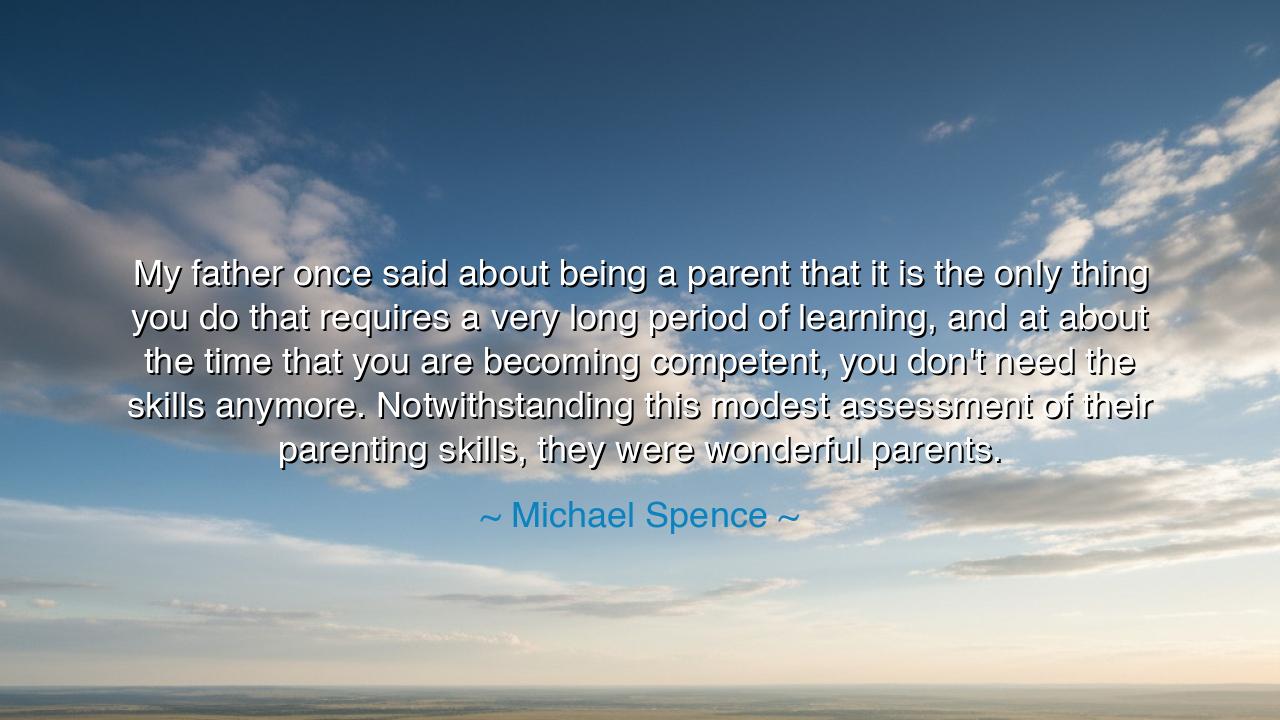
My father once said about being a parent that it is the only
My father once said about being a parent that it is the only thing you do that requires a very long period of learning, and at about the time that you are becoming competent, you don't need the skills anymore. Notwithstanding this modest assessment of their parenting skills, they were wonderful parents.






Michael Spence, a Nobel laureate in economics, once shared a truth handed down by his father, a truth that pierces to the heart of human experience. “My father once said about being a parent that it is the only thing you do that requires a very long period of learning, and at about the time that you are becoming competent, you don’t need the skills anymore. Notwithstanding this modest assessment of their parenting skills, they were wonderful parents.” In this statement, we are reminded that the journey of raising children is unlike any other: it is a lifelong apprenticeship where the lessons come slowly, and mastery is reached only as the season of need passes.
The wisdom here is bittersweet. The long learning of parenting is not like training in a craft or study of a discipline, where mastery brings decades of fruitful work. In parenting, by the time you learn to soothe the cries, the child no longer cries; by the time you master guidance for a teenager, they have already grown into an adult. This is the strange paradox: the skills sharpen even as the need for them fades, leaving parents with wisdom they can no longer fully apply. Yet this is not futility—it is a gift passed forward, a treasury of knowledge that can be shared with others, with grandchildren, with the next generation of wanderers entering the path of parenthood.
History offers us a reflection of this truth in the life of King Solomon, who prayed not for riches or power, but for wisdom to guide his people. And though he gained wisdom, often it came after mistakes had already shaped his reign. So it is with parents: wisdom blooms often after the hardest trials, when the moment has already passed. But that wisdom, though late, is not wasted—it is a beacon for those who come after, a light for the children who will one day guide children of their own.
Spence’s words also carry the tenderness of gratitude. Despite his father’s modest assessment of his own abilities, the son declares that his parents were wonderful. This shows us another truth: parents may see their own shortcomings, may feel unskilled, uncertain, or late in their learning, but children often remember love more than technique. What endures is not the perfection of the parent but the spirit of their devotion. Even fumbling hands can raise a noble heart when guided by love.
The message to future generations is clear: do not despair at your slowness in learning. Do not be crushed by the feeling that you are only now beginning to understand as the time slips away. For such is the nature of parenting—a task that shapes you as much as you shape another. It is not only the child who grows, but the parent also grows, transformed in patience, humility, and wisdom. In truth, it is a divine exchange: while you labor to form another soul, your own soul is being formed.
Let us take as a lesson that competence is not the highest measure of a parent. What matters most is presence, willingness, and love. A parent need not wait until mastery to give fully of themselves. Each stage, though filled with uncertainty, is enough when infused with care. The art of parenting is not about perfection at the end, but about faithfulness in the moment.
Therefore, let all who walk the path of motherhood or fatherhood embrace this teaching: cherish the fleeting seasons, for they will pass before you feel ready. Offer yourself wholly, even in ignorance, for the child will remember your presence more than your precision. When the skills are no longer needed, the love will remain, and in that love, you will have fulfilled the sacred calling.
In the end, Spence’s reflection becomes not one of regret but of triumph. The seeming waste of long learning is redeemed in the testimony of a grateful child: “They were wonderful parents.” This is the crown of parenthood—not mastery of skills, but the lasting impression of love. And that, more than any wisdom acquired, is the true legacy parents pass on to eternity.






AAdministratorAdministrator
Welcome, honored guests. Please leave a comment, we will respond soon